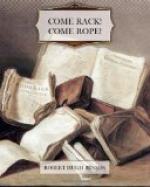Marjorie waved it aside.
“Yes; he would be very hot; but for all that, there is his son Robin you know—and his memories. And Robin has not written to him for six months. That would be about the time when he told him he was to be a magistrate.”
Then Marjorie told her of the whole that had passed, and of his mention of the FitzHerberts.
“And what he meant by that,” she said, “I do not know; but I will tell them.”
* * * * *
She was pondering deeply all the way as she rode home. Mistress Alice was one of those folks who so long as they are answered in words are content; and Marjorie so answered her. And all the while she thought upon Robin, and his passionate old father, and attempted to understand the emotions that fought in the heart that had so disclosed itself to her—its aged obstinacy, its loyalty and its confused honourableness. She knew very well that he would do what he conceived to be his duty with all the more zeal if it were an unpleasant duty; and she thanked God that it was not for a good while yet that the lad would come home a priest.
CHAPTER VIII
I
The warning which she had had with regard to her friends, and which she wrote on to them at once, received its fulfilment within a very few weeks. Mr. John, who was on the eve of departure for London again to serve his brother there, who was back again in the Fleet by now, wrote that he knew very well that they were all under suspicion, that he had sent on to his son the message she had given, but that he hoped they would yet weather the storm.
“And as to yourself, Mistress Marjorie,” he wrote, “this makes it all the more necessary that Booth’s Edge should not be suspected; for what will our men do if Padley be closed to them? You have heard of our friend Mr. Garlick’s capture? But that was no fault of yours. The man was warned. I hear that they will send him into banishment, only, this time.”
* * * * *
The news came to her as she sat in the garden over her needlework on a hot evening in June. There it was as cool as anywhere in the countryside. She sat at the top of the garden, where her mother and she had sat with Robin so long before; the breeze that came over the moor bore with it the scent of the heather; and the bees were busy in the garden flowers about her.
It was first the gallop of a horse that she heard; and even at that sound she laid down her work and stood up. But the house below her blocked the most of her view; and she sat down again when she heard the dull rattle of the hoofs die away again. When she next looked up a man was running towards her from the bottom of the garden, and Janet was peeping behind him from the gate into the court. As she again stood up, she saw that it was Dick Sampson.




